The Architecture of Intelligence - Derrick de Kerckhove
An Interview with Derrick de Kerckhove
The McLuhan Centre for Culture and Technology
conducted by Álvaro Bermejo
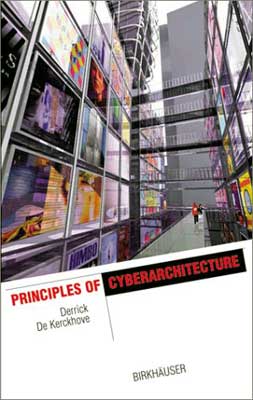
[...] AB: We have left the “global village”, we surf the Web of Webs but the technical abilities of the average citizen are not much greater than those of a Neanderthal. Beneath the veneer of culture, what sort of human being is this digital culture creating?
DdeK: The average citizen is always in Neanderthal mode. That is why we get such Neanderthalian politicians. The digital culture is the cognitive phase of electricity. Just as we took the muscular phase (heat, light and energy) for granted, we are taking this new phase for granted. Most people only worry about how their body works when they have a backache, or about their car when they have to bring it to the garage. And even then, they don’t want to know. But there is hope. The transformation is happening just as surely and unconsciously as it did at the time of the council of Trent when wise people were trying to put an old order into a religion that was being rapidly undermined by a totally new conception of man. Today, we are literally run over by the globalized and connective condition of humankind without the slightest moment of doubt.

AB: You claim that information processing systems – especially hypertext – are extensions of our mind, rather like psychotechnologies. If we juxtapose your data with the latest advances in genetic engineering and cloning, what sort of future awaits us?
DdeK: I call them psychotechnologies because they have one specific feature that they do not share directly with genetic engineering, that is their relationship to language. All technologies that code, sort and transport language also modify it and modify the speaker, listener, and generally the user of language. Language entertains an intimate relationship with our mind and all technologies that affect language also affect the strategies we use to organize time, space and self. Hence psycho-technologies restructure our minds. But even if genetic engineering can eventually affect the way we (or the animals we change) think, it bypasses language to address the basic building materials of the physical being. These are different, although equally important manipulations of the status quo of our being. I can’t predict the future that awaits us, my sole ambition is to predict the present.
AB: Why does “virtual culture” seem to us to be an innocent concept whereas the idea of “virtual democracy” appears suspect?
DdeK: Actually neither concept is innocent. Arthur Kroker wrote some rather perceptive and biting comments on the Virtual Class and the Data Trash world; on the other hand, with blogs, virtual democracy seems at least to represent a possible transmutation of democracy without losing its principal character, which is to give power to the people in reasonably equal measure. The present question is to what extent can the larger bulk of the population of the world participate usefully in blogs. [...]
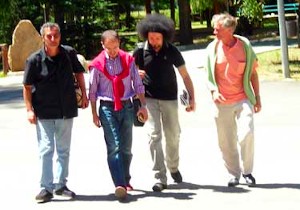
Connected Intelligence: The Arrival of the Web Society
II International Philosphy Convention in Sila, june 28 2007, Serra Pedace - june 29/30 2007, Silvana Mansio - Francesco Saverio Alessio - Antonio Tursi - Emiliano Morrone - Derrick De Kerkhove - photography: Carmine Talerico - © copyright 2007
In Connected Intelligence, Derrick de Kerckhove speculates on the consequences of massive global networking and what might happen if it reaches a critical mass of "connected intelligence." Will the sum total of people's connected intelligence be vastly more intelligent than any one person's intelligence could hope to be? This startling proposition points directly to the possibility that we are undergoing one of the greatest leaps in the evolution of our species. Connected intelligence may be the next step in the evolution of human intelligence.
Connected Intelligence (Somerville, 1997) introduced his research on new media and cognition.
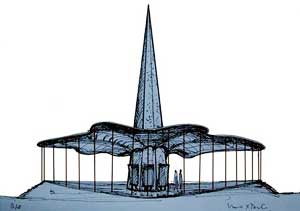
The Global Village Square (GVS)
One of the proposed GVS Architectural concept (Paolo Di Caterina, architect) - The Global Village Square (GVS) is a public service. It will allow people to meet across land and sea, but as if they were in a common ground.
Derrick de Kerckhove has been working on The Global Village Square, a global architecture project proposing a permanent public video-meeting point between Toronto and two Italian cities, Naples and Milan. "The Global Village Square (GVS) is grounded in electronic, not physical space, but it is just as durable and at least as "natural" as electric lighting in the city. The space joining Milano and Toronto, for example, would be the first of its kind in history, but I expect that one day many cities, including some of the economically and politically struggling communities will be connected this way. This kind of development may one day be required to install and mantain peace and global civility".

"The medium is the message"
Marshall McLuhan (1911-1980) was a Canadian educator, philosopher and scholar - a professor of English Literature, a literary critic and a communications theorist. McLuhan's work is considered as one of the cornerstones of the study of media theory.
The title "The Medium Is the Massage" is a teaser—a way of getting attention. There's a wonderful sign hanging in a Toronto junkyard which reads, 'Help Beautify Junkyards. Throw Something Lovely Away Today.' This is a very effective way of getting people to notice a lot of things. And so the title is intended to draw attention to the fact that a medium is not something neutral—it does something to people. It takes hold of them. It rubs them off, it massages them and bumps them around, chiropractically, as it were, and the general roughing up that any new society gets from a medium, especially a new medium, is what is intended in that title."
Marshall McLuhanThe Life of Space by Derrick de Kerckhove and Antonio Tursi
[...] In the world of Linden Lab, we investigate to the full the spatialisation of the quantity of data processed by our computers. We are in this space, we inhabit it and we create relationships with landscapes, situations and alterity. All of this requires a concerted effort from architects, focused in at least two directions. First of all, we must design the land, the buildings that sit on it and the landscapes in which we move. That SL operates beyond perspective is more than evident, and emblematically represented by the function that allows for 360-degree vision. At present, the majority of SL’s builders re-propose the spaces of real life. Perhaps, however, it is precisely thanks to worlds like SL that we can understand the trend towards a new sort of ‘mixed reality’, one in which we confuse the boundaries between atoms and bits.
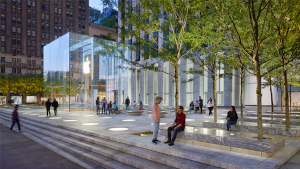
Let us take as an example the Apple Store on Fifth Avenue in New York, designed by Peter Bohlin. This glass cube, almost 10 metres (32.8 feet) high, creates a significant instability of perception. It has its double in SL. In short, Apple offers its clients different spatial experiences, which overlap and fuse with one another. This is the same mixed reality that a team at the McLuhan Program in Culture and Techonology has imagined in the Global Village Square project: a virtual public square, created using giant screens installed in galleries and shopping malls and capable of uniting, for example, Toronto and Naples by transmitting images and the voices of visitors as they walk around the screens. [...]
Architecture of Intelligence is born from the commixture between the vision of Derrick de Kerckhove and Giuseppe Stampone‘s artistic experimentations with the neo-dimensional experiences of Solstizio. Its first form was contained in some works by the artist (To Flavio), as a infiltration process between physical and liquid worlds, through the use of social networks and three-dimensional worlds such as Second Life. [...]
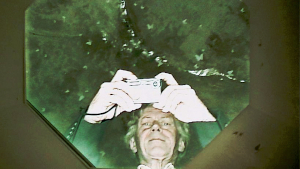
A.I. Architecture Intelligence :: Future Architecture
A.I. is already quite present and is used very often by architects for their projects, be that using something as boring as a calculator or as fun as BIM software. A perfect example of using A.I. to solve problems that would take days for an architect, is the space syntax software ‘depthmapX’ by The Bartlett at UCI. It uses A.I. to analyse the spatial network on many levels without the need of going on site. [...]
Marshall McLuhan as a Realist Philosopher by A. Leo Reilly
McLuhan, like the Porch philosophers, annoyed his critics by eliminating traditional distinctions among subjects. Any distinction between science and technology is an illusion since the same elements of human activity are required in both. Media become technologies when they are put to human uses. Media exert their message apart from the message the technologist intends. [...]
Allen Ginsberg about Marshall McLuhan
(The) conclusion is that there is a possibility of reversing the black magic and turning it to, say, white magical purposes, or to neutral purposes, and the possibility is by making people conscious of – the effect on their brains and on their consciousness of the machinery, wishing everybody uses it, as it were, as a teaching machine. This is what your fellow citizen, (sic) Marshall McLuhan, has been saying very objectively and very clearly for a long time – that we have surrounded ourselves with machines which are influencing the very nature of our consciousness and that we better become aware of that influence [...]

Olympia Museum: from Zeus Temple - Peonio: Nike
Photography by Francesco Saverio Alessio - © copyright, all rights reserved, 1998
Paeonius won the commission to decorate the acroteria of the Temple of Zeus at Olympia, as described in the pedestal inscription on his Nike statue. An ancient account also references Paeonius' work at Olympia. Pausanias attributes the front (east) pedimental sculptures of the Temple of Olympian Zeus to Paeonius. The Nike Temple parapet at Athens is also often attributed to Paeonius, on the basis of similarities between the styles of drapery on both monuments. [...]

Gibellina Museum: Francesco Venezia Architect
Photography by Francesco Saverio Alessio - © copyright, all rights reserved, 1986
It is actually a building that does not have a real function. Its function coincides with its presence, like ruins or wrecks. The Venezia Museum appears silently in the midst of this whirlwind of design self-references. The ruins appear in the Roman countryside, or the ancient vestiges in the bare landscapes of the Greek lands.

Capri: Sphinx on the terrace of Axel Munthe House
Photography by Francesco Saverio Alessio - © copyright, all rights reserved, 1985
The beautiful house and garden of the Villa San Michele. Axel Munthe was the creator of San Michele. Already as a young physician, he decided to put into reality his dreams, ambitions and ideas through the creation of a home in Anacapri, which later became world renowned through the success of his book, The Story of San Michele. The book can be read in no less than 45 languages and the Villa San Michele is visited by millions of people from all over the world. [...]